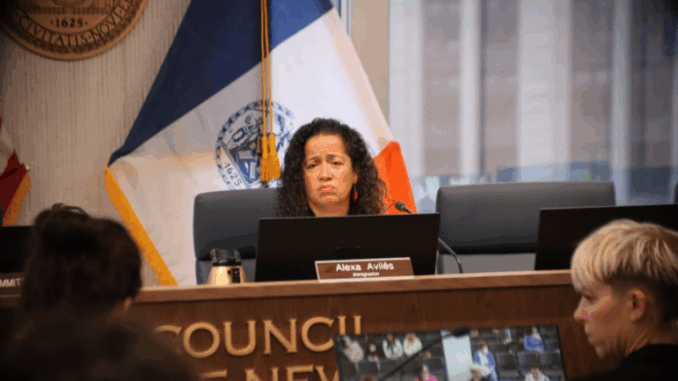
BY MARYANA AVERYANOVA
Over four hours, New York City Council members heard emotional public testimonies about immigrant children, adults and families living in fear and trauma, who face systematic barriers to mental health care.
Alexa Avilés, chair of the committee, opened the September 16 oversight hearing with a reminder of the city’s dependence on immigrants and their importance. “New York City owes a lot to immigrants. The richness of our arts, of our food, the strength and creativity of our businesses,” Avilés said. “This city is special because of immigrants, their children, and their great-grandchildren who live here, work, and learn here.”
Avilés criticized federal policies that have intensified fear in immigrant neighborhoods and families. “The toll these actions take on mental health and wellbeing of immigrants and their loved ones is unimaginable. Punitive policies have devastating consequences on the mental health of immigrants and their descendants,” said Avilés.
The committee’s goal was clear: to question city officials about what specific mental health resources are available to immigrant communities regardless of status, and how their departments connect people to those services and how they ensure cultural sensitivity and language access.
Facing council members, Kenneth Lo, Senior Advisor on Interagency Partnerships for Mayor’s Office of Immigrant Affairs (MOIA), outlined MOIA’s legal outreach, “ The 38 MOIA legal support centers help community members understand their legal options, providing a range of services.” As he explained, these centers are located in immigrant neighborhoods, so people can easily access services they need.
Nisha Agarwal, Executive Director for Policy and Communications at the Department of Health and Mental Hygiene (DOHMH), described the city’s 988 mental health hotline. “Interpretation support is available in over 200 languages. NYC 988 can refer callers to services that meet their individual needs and preferences including language, insurance and location,” said Agarwal.
Despite the existing program, Agarwal acknowledged that there are still existing challenges. “Immigrant adults are nearly twice as likely to lack access to health insurance as US born adults. Immigrants with depression are less likely to receive mental health treatment compared to US born residents with depression,” she said.
Avilés expressed gratitude to those officials who attended this hearing and also expressed frustration that top city officials did not attend, saying their absence signaled a lack of concern.
During the hearing, community members listened intently. When Council Member Alexa Avilés stated some of the most troubling facts about the city’s immigrant mental health crisis, they responded with quiet finger snaps — a subtle but powerful sign of solidarity and support.
As the city officials’ testimonies concluded, the focus shifted to members of the public, who shared professional views and personal stories. Their testimonies had a variety of views, but one thing was certain, many non-profit organisations are helping immigrant families to fight their fears and fight for their rights.
“With real language access, including indigenous languages, we can finally begin to build trust and reach more families who need help,” said Sierra Kraft, Executive Director of Immigrant Children Advocates’ Relief Effort (ICARE).
“Many students live with constant fear that their parents or loved ones could be detained or deported,”expressed Andrea Ortiz, DSC-NY Membership and Campaigns Director.
“In class, there’s no bilingual social worker, no trusted adult who understands the language or cultural background of students. These kids are left without anyone to turn to,”said Jania Witherspoon, Co-Founder at The Circle Keepers.“We must invest in a workforce pipeline to train providers who can reflect the languages, cultures and lived experiences of our immigrant communities.”
Charles Brown, Director of The Immigration Legal Program at Lutheran Social Services of New York (LSSNY) schools, expressed his opinion about officials’ testimonies and the city’s 988 hotline. “I think getting out into the community is important. Often many experience long wait times when they’re trying to reach services. They don’t end up going because the wait time is too long… I would love to see just some accountability on that.”
